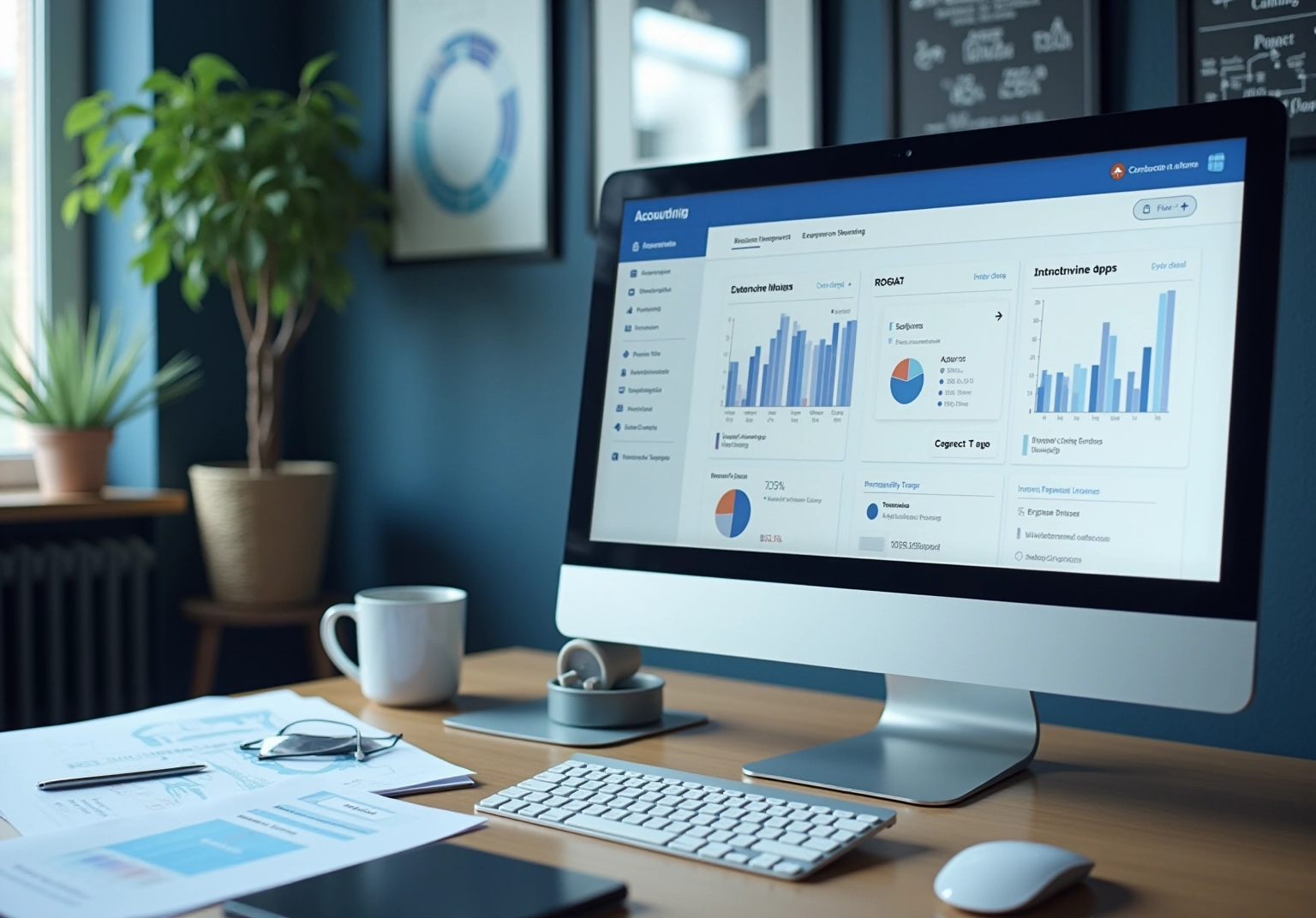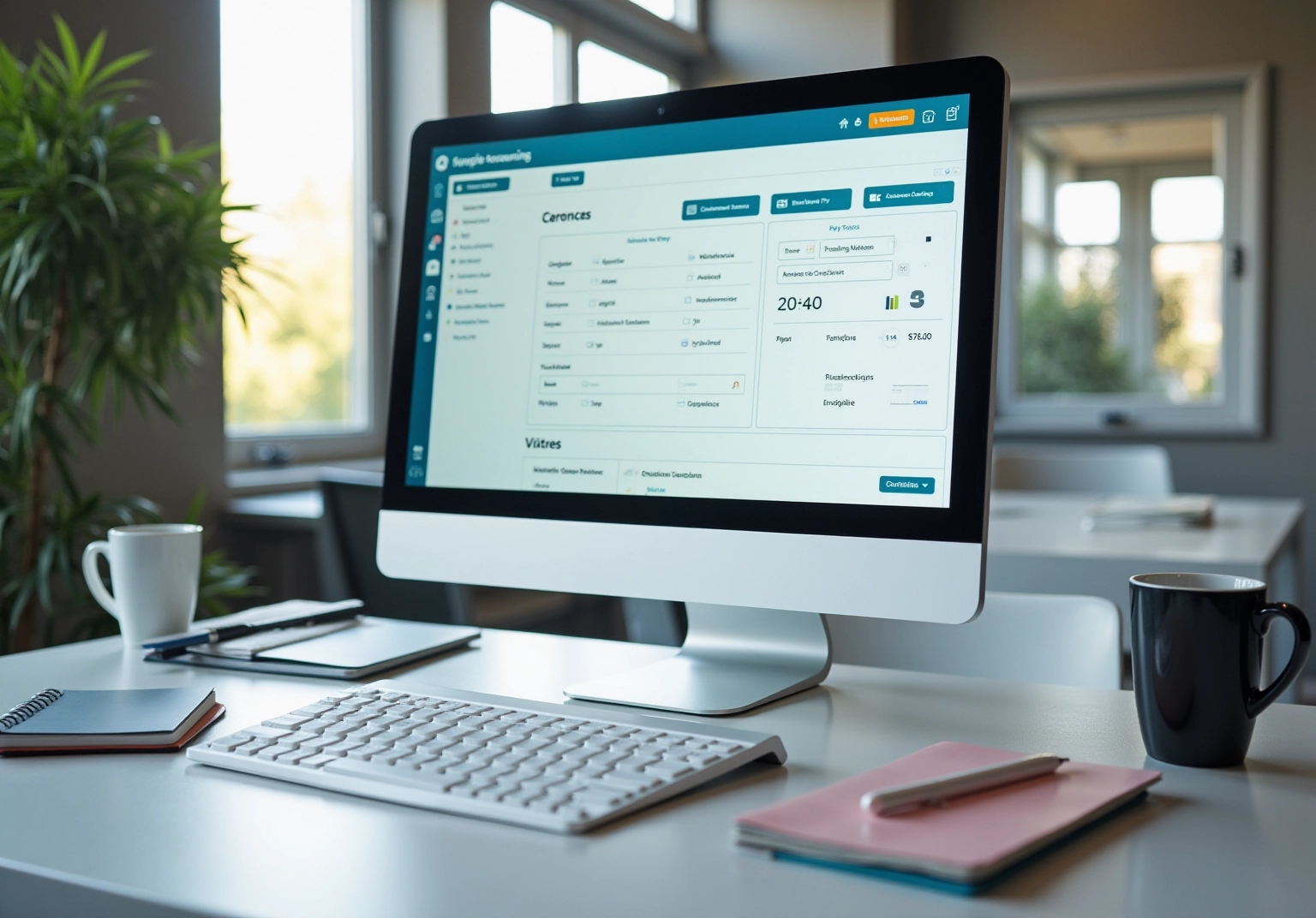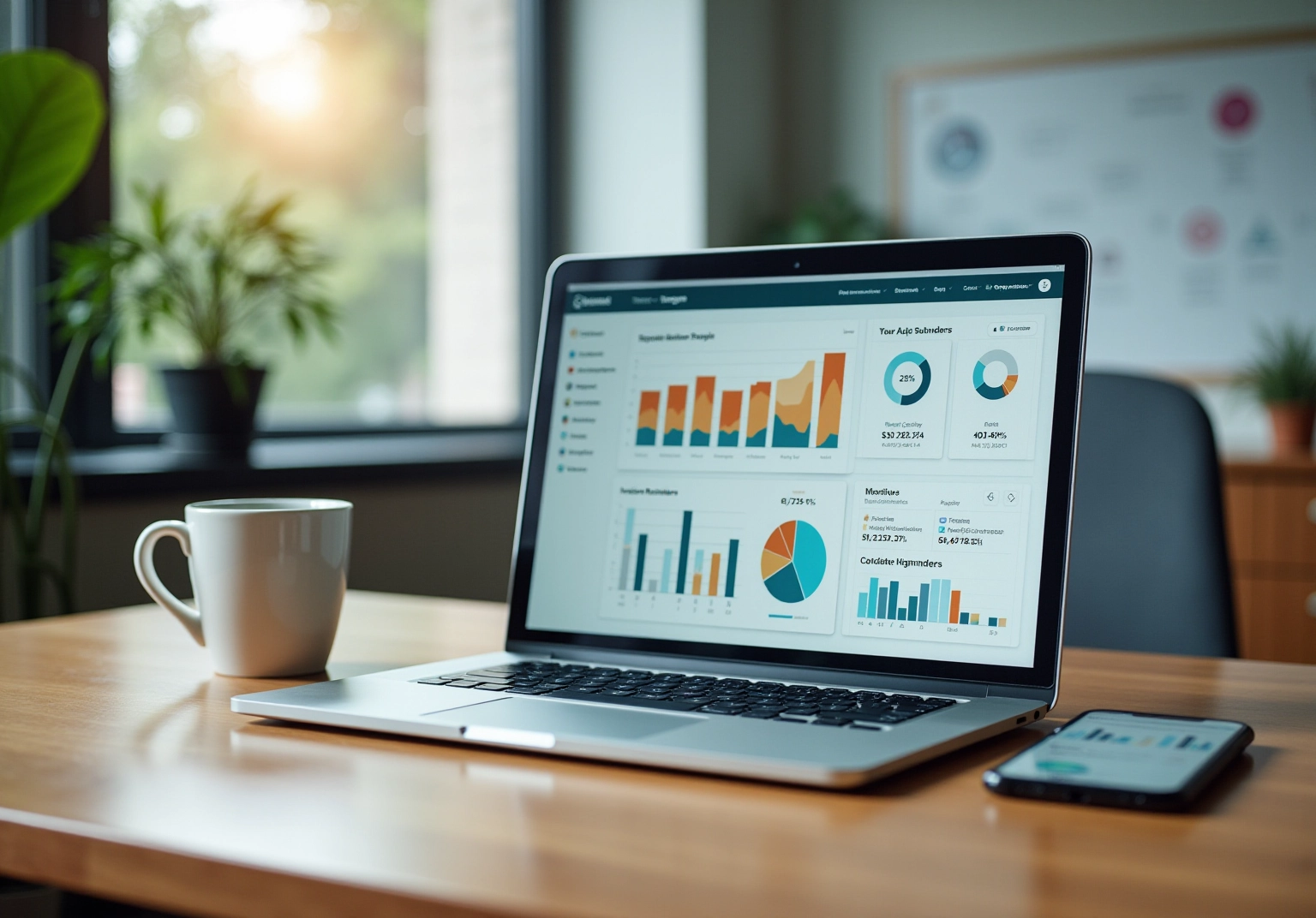Overview
The premier accounting app for UK accountants encompasses vital elements such as usability, integration, scalability, compliance, and robust support. These features collectively enhance operational efficiency and elevate client satisfaction. Notably, automated invoicing, real-time reporting, and effective client communication tools streamline processes, fostering improved decision-making within accounting practises. By addressing the current challenges faced by accounting managers, this app positions itself as an indispensable tool in the industry, ultimately prompting accountants to elevate their practises and client interactions.
Key Highlights:
- Usability is crucial for accounting apps, enhancing productivity and reducing the learning curve.
- Integration with existing tools is essential for seamless data transfer and improved workflow.
- Scalability allows accounting apps to grow with the business, handling increased data and users efficiently.
- Compliance with regulations like GDPR is necessary for maintaining customer trust and legal adherence.
- Support and training resources significantly impact user experience and adoption rates.
- Automated invoicing and real-time reporting streamline processes and enhance decision-making.
- Client portals improve communication, leading to higher engagement and response rates.
- Pricing models include subscription-based, tiered, one-time fees, and freemium options, catering to diverse business needs.
- User experience is influenced by ease of use, customer support, performance, and community feedback.
- Tools like Glasscubes enhance client interaction and streamline communication, improving overall efficiency.
Introduction
As the landscape of accounting continues to evolve, the demand for efficient and user-friendly accounting applications has never been more critical for UK accountants. The right accounting app can transform workflows, enhance client interactions, and ensure compliance with ever-changing regulations. However, with a myriad of options available, how can one determine which features truly set the best accounting apps apart? This article delves into the key criteria for evaluating accounting software, the essential functionalities that drive user satisfaction, and the pricing structures that impact decision-making, ultimately guiding accountants in their quest for the perfect app.
Key Criteria for Evaluating Accounting Apps
When evaluating accounting apps, several key criteria must be considered:
- Usability: An intuitive interface is paramount, significantly reducing the learning curve for users. A user-friendly design in the best accounting app allows accountants to focus on their core tasks instead of navigating complex systems. Industry leaders assert that usability is essential for the best accounting app acceptance, as it directly influences productivity and efficiency.
- Integration: Compatibility with existing tools and platforms is crucial for seamless data transfer and enhanced workflow efficiency. Successful integration examples from UK firms, such as those utilising Glasscubes, illustrate that the best accounting app can synchronise effectively with current systems to markedly improve operational effectiveness. Glasscubes alleviates common frustrations associated with email communication—like lost information and repeated requests—by providing a centralised platform for customer interaction.
- Scalability: The application must be capable of evolving alongside the business, handling increasing data volumes and user numbers without performance degradation. This adaptability is vital for organisations aiming to expand their operations while utilising the best accounting app without frequent system modifications.
- Compliance: Adhering to UK regulations, including GDPR, is essential for maintaining customer trust and circumventing legal complications. Compliance features not only safeguard sensitive information but also strengthen the firm’s reputation in the marketplace, which is essential for the best accounting app. Glasscubes ensures secure, encrypted communication that aligns with GDPR requirements, offering peace of mind for both firms and clients.
- Support and Training: The availability of customer assistance and training resources can significantly impact the user experience and adoption rates of the application. Firms that offer comprehensive onboarding support often report higher satisfaction and productivity levels among their accounting teams, which can be facilitated by the best accounting app. Effective training facilitates a smoother transition and optimal utilisation of the software, especially when shifting from traditional email methods to a more structured approach like Glasscubes.
Pros and Cons:
- Pros: Enhanced usability drives increased productivity; seamless integration optimises operational efficiency; scalability fosters business growth; compliance ensures legal adherence; robust support improves user experience.
- Cons: Potential learning curve for intricate systems; challenges with integrating legacy systems; scalability may incur additional costs; compliance features can be complex to implement; support quality may vary by vendor. Glasscubes addresses these concerns by delivering user-friendly interfaces, effective integration solutions, and comprehensive support resources.

Essential Features of Top Accounting Apps
The best accounting app for UK accountants encompasses essential features that significantly enhance operational efficiency and client satisfaction.
- Automated Invoicing streamlines the billing process, drastically reducing manual errors and saving valuable time. With automation, financial professionals can process invoices up to six times faster, allowing them to focus on higher-value tasks.
- Real-Time Reporting provides current financial insights, empowering financial professionals to make informed decisions swiftly. This capability is increasingly vital, as 86% of CFOs recognise the digitisation of finance processes as central to their organisations’ success, thereby enhancing overall operational efficiency.
- Client Portal facilitates seamless communication and document sharing between financial professionals and customers, significantly improving engagement and response rates. Companies utilising such portals have reported a 40% increase in customer response rates, underscoring the effectiveness of streamlined communication. Glasscubes excels in this area, offering a centralised platform that reduces response times by 50%, ensuring that both financial professionals and clients have real-time access to necessary information.
- Automated Reminders from Glasscubes empower accountants to send personalised notifications to clients, ensuring timely submission of required documents. Accountants can dispatch up to 10 reminders on a straightforward schedule or employ advanced options for unlimited reminders with customisable messages, indicating urgency for upcoming deadlines. This feature optimises client communication and enhances the overall efficiency of the accounting process.
- Expense Tracking simplifies the management of business expenses, ensuring precise financial records. By automating expense tracking, financial professionals can mitigate the risk of errors and bolster adherence to tax regulations.
- Payroll Management automates payroll processes, ensuring compliance with tax regulations while alleviating administrative burdens. This automation not only saves time but also enhances accuracy, enabling financial professionals to concentrate on strategic financial planning.
Incorporating these features, Glasscubes becomes the best accounting app by revolutionising client interaction for accountants, streamlining the audit process and ultimately enhancing client satisfaction.

Pricing Structures of Leading Accounting Software
Pricing structures for leading accounting software exhibit considerable variation, typically categorised into four main models:
- Subscription-based pricing is a prevalent model used by the best accounting apps, such as Xero and QuickBooks, featuring monthly fees ranging from £10 to £60. It allows companies to leverage essential functionalities without incurring substantial initial costs, making it an attractive option for enterprises of all sizes.
- Tiered Pricing: Many software solutions adopt a tiered pricing strategy, enabling users to select plans that align with their specific needs. Higher tiers often unlock advanced capabilities, catering to firms seeking enhanced functionality and support. This approach has proven successful, with numerous companies reporting increased customer satisfaction and retention as clients can choose plans that best fit their operational requirements.
- One-Time Fees: Some applications offer a one-time fee for perpetual licences, which can be more economical for firms that prefer to avoid ongoing payments. This model appeals to businesses looking for long-term solutions without the commitment of monthly subscriptions.
- Freemium Models: Certain platforms provide basic features at no cost, with options to upgrade for additional functionalities. This model is particularly attractive to startups and small businesses, enabling them to evaluate the system’s capabilities before making a financial commitment.
Experts in the field emphasise that subscription-based pricing models enhance flexibility and foster better client relationships by providing continuous updates and support. As the accounting landscape evolves, understanding these pricing models becomes essential for firms looking to maximise their investments in the best accounting app and enhance operational efficiency.
User Experience and Satisfaction Ratings
User experience and satisfaction ratings for the best accounting app can vary significantly, influenced by several key factors that are crucial for accounting professionals.
- Ease of Use: The best accounting app, including Xero and QuickBooks, is frequently lauded for its intuitive interfaces. These designs not only enhance user satisfaction but also minimise the time required for training. A study suggests that 58% of accountants believe technology has enhanced efficiency and productivity, underscoring the significance of user-friendly design in application adoption.
- Customer Assistance: High satisfaction ratings are commonly linked with the best accounting app, which provides robust customer support options, including live chat and extensive help resources. Users consistently report that effective support significantly enhances their experience, facilitating quick and efficient issue resolution.
- Performance: Users place great importance on speed and reliability in the best accounting app. Top-rated applications, like the best accounting app, exhibit minimal downtime and swift processing times, which are essential for maintaining productivity in fast-paced accounting environments. Statistics indicate that 91% of experts claim technology allows them to focus more on customers, further emphasising the necessity for dependable system performance.
- Community Feedback: Community feedback shows that platforms recognised as the best accounting app often receive higher satisfaction ratings due to their active user communities. These communities foster collaboration by allowing users to share tips and solutions, enhancing the overall experience. Notably, 86% of small business owners view their accountant as a trusted advisor, highlighting that community support extends beyond software to encompass professional relationships.
- Customer Engagement: Tools like Glasscubes have transformed customer interaction for accounting firms by offering a secure, centralised workspace. Users report that this setup streamlines communication and improves response times. Clients appreciate the ability to log in and view outstanding queries and information, which reduces reliance on constant email exchanges. This transparency fosters faster replies from customers, enhancing overall efficiency in information collection. As one user noted, the capacity to view all queries in a single location has significantly improved their workflow and interactions with customers.
In summary, the interplay of ease of use, customer support, performance, community feedback, and effective client engagement plays a vital role in shaping user satisfaction with the best accounting app. Tools like Glasscubes stand out by enhancing communication efficiency and response times, making these factors essential considerations for UK accountants when selecting the best tools for their needs.

Conclusion
The significance of selecting the optimal accounting app for UK accountants cannot be overstated; it has the potential to markedly enhance productivity, streamline workflows, and improve client interactions. By concentrating on essential criteria such as:
- Usability
- Integration
- Scalability
- Compliance
- Support
Accountants can ensure they select a tool that not only meets their current requirements but also adapts to future growth.
In this article, we have highlighted essential features like:
- Automated invoicing
- Real-time reporting
- Effective client portals
as crucial components that drive operational efficiency and client satisfaction. The exploration of various pricing structures further underscores the necessity of finding a solution that aligns with a firm’s financial strategy while delivering the required functionalities. User experience and satisfaction ratings are also pivotal, showcasing the importance of intuitive design and robust customer support in the overall effectiveness of accounting software.
Ultimately, the selection of an accounting app should be guided by a clear understanding of specific business needs and a commitment to enhancing operational efficiency. As the accounting landscape continues to evolve, embracing the right technology can empower accountants to meet future challenges while delivering exceptional service to their clients. Prioritising these considerations will not only facilitate smoother operations but also reinforce the value of accountants as trusted advisors in an increasingly digital world.
